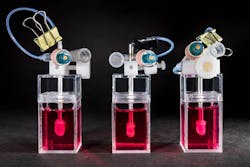Manufacturing Mini-Hearts for Better Health Outcomes
With a tagline of “Make a Heart. Save a Heart,” it might seem incredible that the company, Novoheart, can actually manufacture a live heart.
Founded in 2014, after 15 years of research, the company can do just that and has created what they call “heart-in-a-jar.”
“Our technology is unique in that after much testing and developing we are able to build a heart with human tissue that can be used to test the efficacy of drugs,” explains Kevin Costa, chief scientific officer. “It’s a huge breakthrough that has many future applications to ensure better health with the ultimate goal of preventing heart problems.” The company is currently working with a number of both large and small pharmaceutical companies.
The potential of this technology was recognized back in 2015 when the “human heart in a jar” technology was selected by Google’s Solve for X as a Moonshot project.
The company uses stem cell, bioengineering and AI to produce these hearts. The product, whose official name is Human Ventricular Cardiac Organoid Chamber, is the only macroscopic human cardiac tissue model on the market that is capable of mimicking fluid pumping similar to a natural heart.
In layman’s terms here is how the process of production works. (To get a better understanding be sure to watch the video below.). First blood is drawn from a patient, placed in a petri dish and reprogramming factors are added to the cells which cause the cells to be reprogramed to become stem cells. These new cells are called iPS cells. These cells differentiate and become heart cells which are made into cardiac strips. Using ten million heart muscle cells it can be made into a human mini-heart.
What’s especially unique about this heart is that it’s personal so it can be used to test a particular patient’s reaction to drugs. The goal is to better predict the effect of new pharmaceutical compounds on the human heart early in the development process before clinical trials. Applications include cardiac toxicity screening, disease modeling, functional assessment and regenerative studies.
Technologies include a suite of drug discovery tools of human bioengineered heart tissues, as well as hardware and software tools for measurement and analyses using machine learning approaches.
“Machine learning has been a valuable tool as data sets become numerous and AI can take out unintentional bias,” explained Dr. Bernard Fermini, chief research and development officer.
“We have had to overcome a number of technical issues to create this system and in fact, we manufacture the housing for the heart,” says Costa.
The company has moved so far along in the process that they are entering into agreements with other companies to ramp up full-scale production.
In October of 2018, the company entered into a service agreement with Xellera Therapeutics Ltd. to build clinical-grade human stem cell libraries for the development of cell-based therapies. Phase one will focus on the first steps towards Xellera building a Good Manufacturing Practice facility for generating clinical-grade human stem cell lines, initially within the Southern Chinese population.
This arrangement will allow Novoheart to build a new bank of clinical-grade, haplotype-matched human heart cells to develop cell-based heart therapies, and will further expand its offering into clinical applications, in addition to preclinical drug discovery and screening.
“The work we’re carrying out in this service agreement provides an exceptional opportunity to translate our pioneering technologies and experiences in heart engineering into developments of clinical therapies that will have direct benefits to patients," said Costa.
“This is an exciting partnership that represents our commitment to regenerative medicine.”
Regenerative medicine, which involves tissue engineering and molecular biology which deals with the process of replacing, engineering or regenerating human cells, tissues or organs to restore or establish normal function, is the end-goal of Novoheart. The company’s heart can serve as a prototype for next-generation transplantable grafts for regenerative heart therapies.
And toward that end, the company is now developing a custom-made “heart bandage” to repair damaged hearts.
While that might seem like a lofty goal it is within reach for this company. As CEO Ronald Li said in an interview with TMX Group: “Our goal is to revolutionize the process of drug discovery.” And they are already on the path to achieving that goal.
